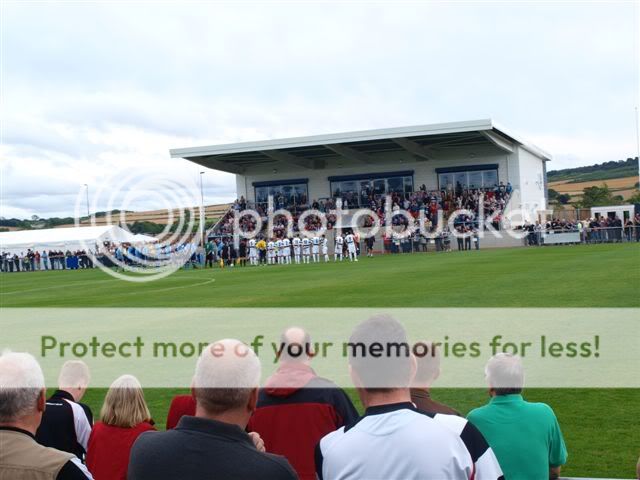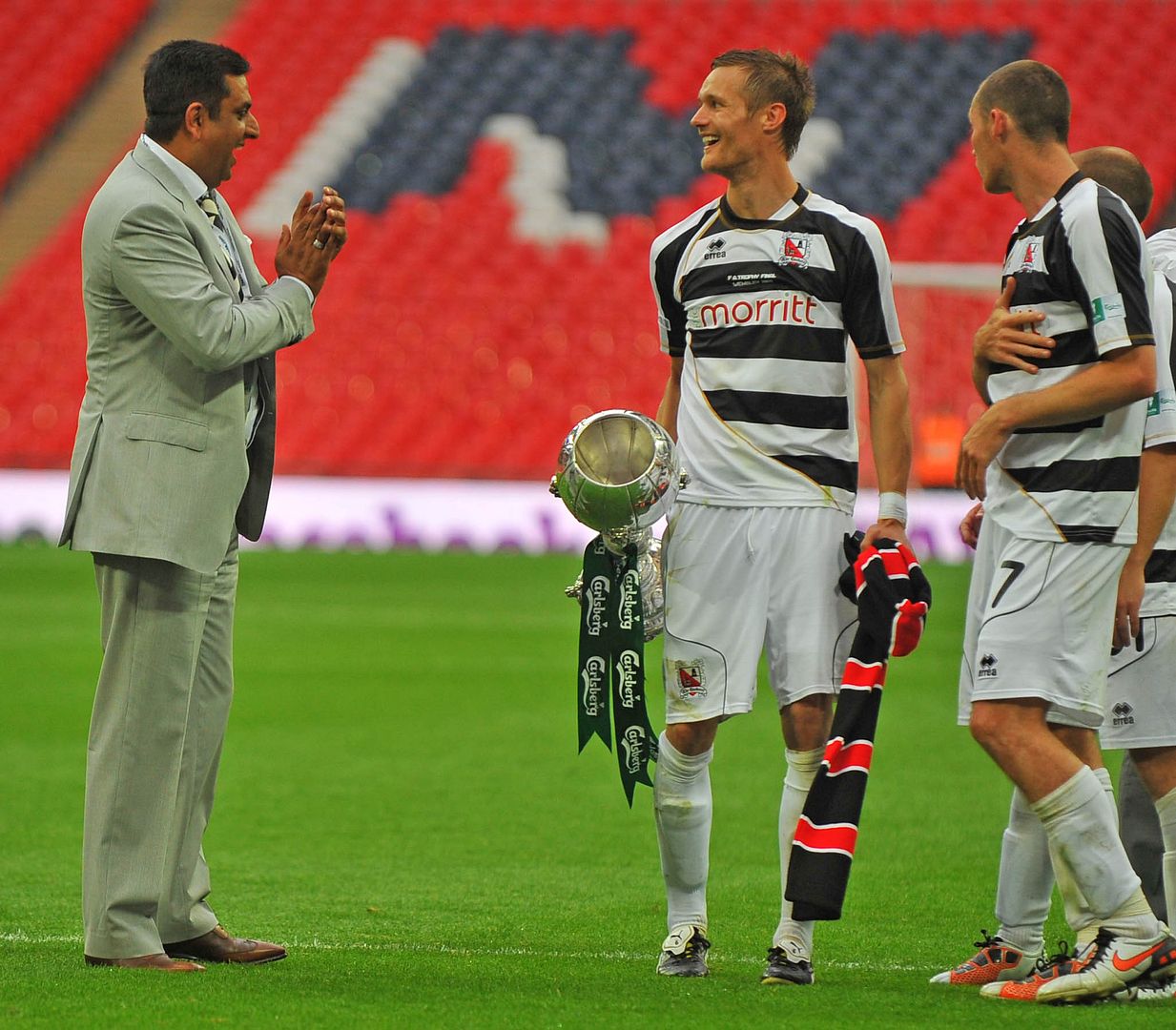


Stadium

| Getting there
To walk Bishop Auckland, Heritage Park. Stadium Way, Bishop Auckland, Co Durham. DL14 9AE (Sat Nav: DL149TL)
It's a 1.6 mile walk to Heritage Park from the railway station, so a bit of a trek. There aren't frequent services to Darlington unfortunately. Trains take about 25 minutes with cheap day returns £4.10. Suggested times: 12:54 (arr 13.20), rtn: 18.02 (arr 18.28)
Buses
Watch out for possible shuttle
buses from Darlington to the ground. This would
seem the obvious solution to travel issues for fans. Darlington Supporters
Trust and Darlington Supporters Club are working together to provide transport
to Darlington Football Club’s home matches at Heritage Park, Bishop Auckland
– starting with the home game against Marske United on Tuesday 21st August.
A double-decker bus has been booked to take fans from Darlington to the
match and back again. The bus will leave the town centre at 6.30pm and
there will be pick-ups at Cockerton and Faverdale. The bus will return
from Heritage Park 15 minutes after the final whistle. The return fare
will be £4 and all seats will have to be reserved and paid for in advance.
Bookings can be made at the Club Shop, open daily in the covered market
(except Sunday), or at the Hole in the Wall drop-in between 7.15pm and
9.15pm each Wednesday evening. Additional buses will be provided if there
is sufficient demand. For further details call 01325 243 911 or email
secretary@darlotrust.org.
Otherwise, there are service
buses, - either the OK1 or X1, which runs every
half hour out of Darlington and stops at the retail park (takes 35-40
minutes). Or the 5, 5a or 5b from Darlington via Newton Aycliffe and Shildon
(300 yards walk)
By car
From junction 58 from the A1, take the
A68 towards Bishop Auckland. At the West Auckland by-pass, turn right at
the roundabout. Go straight across at the next roundabout and the stadium
is located 500 yards on your left. Parking - there are nearby industrial
estates, but be careful about restrictions at nearby supermarkets and retail
park. The club carpark is small.
Taxis
- companies include Shildon Taxis (01388 778877); Town Taxis (01388 777333);
DA Taxis (01388 777262); Aycliffe D&I Taxis (01325 307777)
Local pubs
For real ale, if not Darlington beforehand, there is The Grand Hotel,
Holdforth Crest, Bishop Auckland, DL14 6DU or Locomotion Number One at
Heighington railway station. There is a bar at Heritage Park and for most
matches there are plans for an additional marquee bar for big games.
The Grand Hotel, Holdforth Crest, Bishop Auckland, DL14 6DU
Stanley Jefferson, 5 Market Place, Bishop Auckland, DL14 7NJ Locomotion Number One at Heighington railway station.
Nearest the ground:
The March
Hare, St Helen, Bishop Auckland DL14 9AE Tindale Crossing Brewers' Fayre, West Auckland Road, Bishop Auckland
DL14 9AP The Green Tree, 13 Cockton Hill Road, Bishop Auckland
The Station, 66 Station Road, St Helen Auckland, Bishop Auckland, DL14 9EX
The Bay Horse, Woodhouses, St Helen Auckland, Bishop Auckland, DL14 0LL
At the ground:
The Heritage Bar, Bishop Auckland FC Click for street map of stadium and Slideshow gallery of stadium See also Darlington town centre and pub guide
Ticket details
Season tickets 2012/2013: Adult £150 standing, £195 seated; concession:
£80 standing, £115 seated Aged 6-16: £35 Free under fives
Matchday prices 2012/2013: Standing £8 adults, £5 concessions and £2
for ages 6-16. Free under fives.
The redeveloped ground has an official capacity of 2,003, the main stand
seats 250 and the cover behind the west goal has room for 472. There is
also a temporary stand. The car park has spaces for only 120 vehicles
though, including disabled bays.
The Darlington FC club shop is in the Darlington indoor market or to pay by card over the phone call 07717 345004
between 10am and 4pm.
|
Recent history
Farewell to the cursed Arena

After nine years, three administrations, two relegations and more cursed luck, what was left of Darlington FC decided to move from the 27,500-capacity Darlington Arena for the 2012/2013 season.
Whether it was a monument to vanity, or
just a huge millstone, Darlington 1883 - who took over the club after it came
within minutes of liquidation - decided it could not afford to continue there.
Facing a bill of £250,000 a year to remain, it opted for a deal a tenth
of the price to ground-share at Shildon out of town. The Arena was spectuacularly
unsuited for lower league football, with the club never able to suggest it could
be in the Premiership "in five years," as spouted by then owner George
Reynolds. Four months after the first match in August 2003, the club was in
administration and George Reynolds had resigned as
chairman. By February 2009, it was in administration for a second time and 10
points were deducted under George Houghton.
Out of administration, and the club's new owner
was Raj Singh (pictured left), a business associate of Houghton, who vowed to
get the club on an even keel, earning its way. It was a painful first season,
with Todd being replaced by Steve Staunton, whose tenure as manager was short
lived and unsuccessful. The club used 53 players, finished bottom and with crowds
to match leading to only two sides of the stadium being opened for matches.
Ex-Barnsley boss Simon Davey took over in February 2010 and started rebuilding
for next season and a little of the shattered confidence, with the Quakers putting
something of a run together. But they started 2010/2011 outside the Football
League again. On top of that, Davey left somewhat abruptly and controversially
in the summer to take over at Hereford (an equally short-lived appointment as
it turned out).
Mark Cooper took over and made more changes but gradually made a real impact.
The squad was shaken up but the key signings of Marc Bridge-Wilkinson and
Liam Hatch showed intent on the side of the club. Although missing out on
the play-offs due to early inconsistency, Darlo went on an excellent FA Trophy
run and a lot of the misery of the previous seasons was forgotten after a
dramatic extra time win over Mansfield at Wembly in the final in May 2011.
The success was short lived however, as despite a big overhaul of the playing
squad, Cooper paid the price in October for a poor start to the season. Off
the field, Singh, who was facing complications over the ownership of the stadium
and land, signalled his frustration at the council and at the squad, who he
demanded take a pay cut. More uncertainty.
Then Singh in January 2012 put the club into administration for a third
time. On this occasion, the situation was dire. The players hadn't been paid,
most stadium staff were made redundant and the club was in imminent danger
of folding. The club was rescued by a fans' group, with an initial cash injection,
and it limped towards fulfilling its fixtures but faced relegation after a
10-point penalty. The rescue plan is far more modest. What turned out to be
the final match, a 3-1 win over Kettering in April 2012, was followed by an
announcement the club was to move, with an initial ground-share at Bishop
Auckland. A severe penalty by the FA - who proved poor guardians of the club against its previous owners - of demotion four more rungs of the non-league
ladder was harsh on the supporters who were left trying to salvage the club
after years of mismanagement.
 But
let's quickly return to 2004. The giant "Reynolds Arena" lettering - £1,000
a character - was being removed. A symbolic act by the stadium's new owners
- the guys who'd lent Reynolds the last few million to finish the job. Millions
they haven't seen very much of and were quite keen to claw back at some point.
But
let's quickly return to 2004. The giant "Reynolds Arena" lettering - £1,000
a character - was being removed. A symbolic act by the stadium's new owners
- the guys who'd lent Reynolds the last few million to finish the job. Millions
they haven't seen very much of and were quite keen to claw back at some point.
 Weeks later, Sterling also owned the club and immediately a wind of change
breezed through the marble halls, with hope of considerable changes on and
off the pitch for the better.
Then in March 2006 another twist, when new
owner and chairman George Houghton was unveiled. The 65-year-old Tyneside property
developer, whose portfolio includes nursing homes, didn't arrive to a fanfare.
He pursued a business strategy which was hoping to attract other events to the
stadium and plans to build offices in two of the stadium's corners, and develop
facilities on the site including a hotel, bowling alley, pub/restaurant and
five-a-side and training pitches. Elton John brought the arena's biggest crowd
in the summer of 2008, but frustrating planning delays and the recession left
the club struggling again. George Houghton ushered in a second period of administration
in February 2009, ironically when David Penney's side were looking a good bet
for promotion. The 10-point penalty and the uncertainty was a fatal blow. Before
the end of May, Penney had left for the manager's job at Oldham, the whole squad
was made available and Houghton announced his imminent return, with Colin Todd
in the manager's chair. Houghton warned of cost-cutting and the long term future
of the club was still in doubt.
Weeks later, Sterling also owned the club and immediately a wind of change
breezed through the marble halls, with hope of considerable changes on and
off the pitch for the better.
Then in March 2006 another twist, when new
owner and chairman George Houghton was unveiled. The 65-year-old Tyneside property
developer, whose portfolio includes nursing homes, didn't arrive to a fanfare.
He pursued a business strategy which was hoping to attract other events to the
stadium and plans to build offices in two of the stadium's corners, and develop
facilities on the site including a hotel, bowling alley, pub/restaurant and
five-a-side and training pitches. Elton John brought the arena's biggest crowd
in the summer of 2008, but frustrating planning delays and the recession left
the club struggling again. George Houghton ushered in a second period of administration
in February 2009, ironically when David Penney's side were looking a good bet
for promotion. The 10-point penalty and the uncertainty was a fatal blow. Before
the end of May, Penney had left for the manager's job at Oldham, the whole squad
was made available and Houghton announced his imminent return, with Colin Todd
in the manager's chair. Houghton warned of cost-cutting and the long term future
of the club was still in doubt.
| Club details
Darlington
FC: |